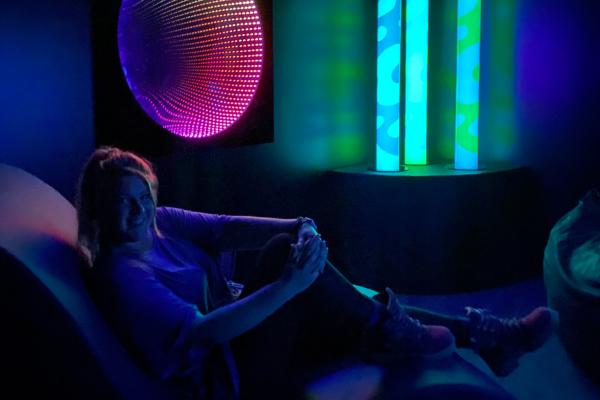You’re at a children’s birthday party at a brash indoor play centre. There are bright lights, vivid colours, loud music and the non-stop, gleeful shrieks for a roomful of overexcited children.
Two hours later, when the party finally finishes, all you want to do is lie down in a dark room for a while. That’ll have to wait though because your child, who had a great time at the party, is now having a major meltdown.
Welcome to sensory overload.
Table of Contents
ToggleWhat is sensory overload?
Sensory overload can affect anyone. It happens when your brain takes in more information from your senses than it can handle all at once.
Your senses help your brain interpret the world around you. Your senses enable you to see, hear, touch, smell, taste, balance and understand where you are. It’s through your senses that you can savour a delicious meal, enjoy music or appreciate a good hug.
But we live in a loud, busy, non-stop world – and sometimes there’s just too much to take in.
Sensory overload may be triggered by:
- Too many people packed into a shop, sports match or concert
- Too much noise, such as loud music, fireworks or traffic
- Unplesasant touch – when things feel too hot, cold, scratchy or rough on your skin
- Strong smells or many different smells at once, such as at a market
- Unexpected or unwanted physical contact
- Dramatic changes in light, temperature or sound
- Tense situations.
What does sensory overload feel like?
Sensory overload basically sends you into a fight-or-flight state where your body and brain are gearing up to handle a major threat.
In addition, sensory overload can trigger a number of other physical or emotional symptoms, including:
- Faster heart rate and breathing
- Stress, fear or anxiety
- Feeling very wound up, restless and tense
- Angry outbursts or emotional meltdowns
- Feeling the urge to cover your eyes or ears to shield them from any more input
- Heightened sensitivity to anything rubbing your skin like a clothing tag.
Who is susceptible to sensory overload?
We all experience sensory overload from time to time, especially if we’re more sensitive than usual due to stress or lack of sleep.
Some people are particularly susceptible to sensory overload because they live with conditions such as:
- Sensory processing disorder
- Generalised anxiety disorder
- Post-traumatic stress disorder (PTSD)
- Attention deficit and hyperactivity disorder (ADHD)
- Autism spectrum disorder.
Benefits of sensory rooms for people at risk of sensory overload
A sensory room is a haven for people with overwhelmed by too much stimulus.
Entering a calming, sensory-soothing space provides room to reset. Studies show that they can help people with:
- Intellectual and learning disabilities to improve self-awareness, social behaviour, communication skills and exploratory skills development
- Autism to experience feelings of comfort, safety and relaxation, enhance a sense of control and choice, regulate their emotions and develop communication and social skills
- Mental health needs to relax, ease distress and self-sooth – they can also reduce the need for seculsion and restraint practices in acute inpatient settings.
Download our free e-book to learn more about the evidence for sensory rooms
But you don’t have to be neurodiverse or live with an ongoing health condition to benefit from a sensory room.
Often when we install our sensory rooms in allied health practices or schools, we find that the staff creep in there once the kids have gone home because they, too, need a room to reset.
How can Creative Sensory Spaces help?
We design, create and install amazing sensory rooms with bold yet harmonious, nature-inspired themes that promote mental and emotional refreshment by engaging the senses.
We know how to bring it all together. Many sensory spaces achieves far less than they could because the elements don’t work well together. As Australia’s leading experts in sensory rooms, we know how to create a design that suits your audience and your budget.





